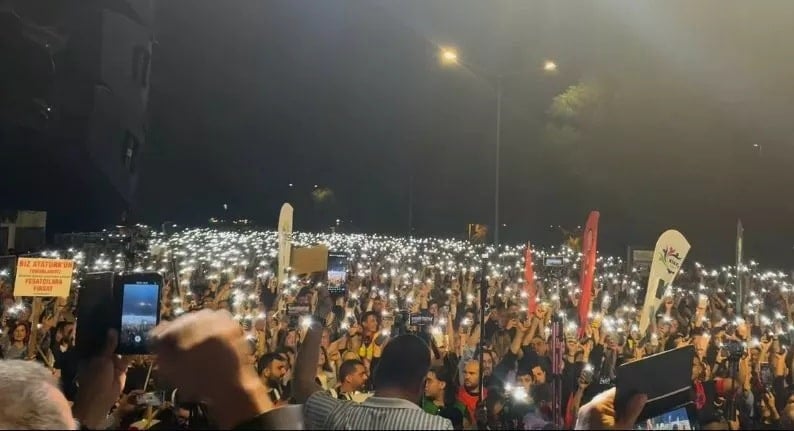

Turkish Cypriots flooded the streets of the occupied territories of Cyprus in a massive protest against the Erdogan government’s push to introduce the Islamic headscarf in schools.
According to a report in “Phileleftheros,” the demonstrations, spearheaded by Turkish Cypriot educational groups, drew participation from prominent political figures.
Former Turkish Cypriot leader Mustafa Akinci and the mayor of occupied Nicosia were notable among the demonstrators. The protests gained significant media coverage within the occupied territories, marking a pivotal moment as Ankara’s decision to permit Islamic attire in schools was seen as a move to exert control.
Under the banner “It will not pass,” the event aimed to challenge the introduction of headscarves and Turkey’s influence on secular education in the occupied territories. The march, attended by thousands, commenced from central Nicosia and culminated at the “parliament” and Turkish “embassy” in the occupied zones.
Chanting slogans like “Cyprus is secular and will remain secular,” “No to coercion and intolerance,” and “We are Ataturk’s descendants,” demonstrators demanded the resignation of the Turkish-Cypriot administration, advocating for secular education. Their message emphasized ongoing resistance against Turkey’s political interference, socio-economic challenges, and threats to the Turkish Cypriot community.
The large demonstrations by our Turkish Cypriot compatriots are not only about opposing the imposition of the Islamic headscarf. They are also a powerful expression of their desire to remain citizens of a modern, European Cyprus. Let all Cypriots stand united against Occupation! https://t.co/nAUsoLKSIO
— Constantinos Christofides (@ChristofidesCY) April 9, 2025
Political backing for the protest came from parties including the Republican Turkish Party (CTP), Social Democratic Party (TDP), People’s Party (HP), United Cyprus Party (VKP), Left Movement, and New Cyprus Party (YKP). Serdar Denktash and Mehmet Kuciuk, sons of former leaders Rauf Denktash and Dr. Fazil Kuciuk, were also present.
Social media posts from Sibel Tatar, wife of Turkish Cypriot leader Ersin Tatar, expressed solidarity with Tuesday night’s march against headscarves in secondary schools. She criticized underage girls being compelled to wear headscarves and study under the gaze of Ataturk’s portrait, calling such actions symbolic and promising a future rally under the theme “Respect for the Motherland,” expecting thousands to participate.
Turkey is not officially forcing the Islamic headscarf in schools, even in the north of Cyprus—but many see its actions as part of a larger push to erode secularism and promote religious conservatism, especially through influence rather than outright legislation.
The Islamic headscarf (hijab) was once banned in public institutions like schools and universities under Turkey’s secular laws. Over the past two decades, under President Erdogan’s AKP government, those restrictions were gradually lifted.
Today, wearing a headscarf is allowed in public schools and universities, and it’s a personal choice—not officially forced by the state, but strongly supported by the government and religious institutions.
Occupied Northern Cyprus has traditionally been more secular than mainland Turkey. Recently, there’s been growing concern among Turkish Cypriots that Ankara is pushing more conservative, religious policies in the north—including the acceptance or normalization of headscarves in secondary schools.
